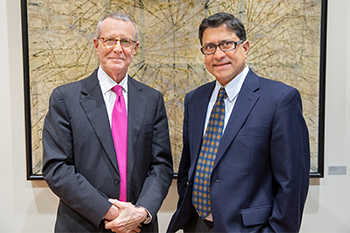Pancreas Center Research
About Our Research

Pancreas Center Research
The Pancreas Center at BIDMC is an internationally renowned program that provides expertise in the diagnosis and management of exocrine pancreatic diseases under the leadership of Dr. Steven Freedman and Dr. Sunil Sheth. The center is a local, national and international leader for groundbreaking clinical and translational research in the field of pancreatic diseases, including but not limited to, acute and chronic pancreatitis, exocrine pancreatic insufficiency, and pancreatic cancer.
Our current areas of research are divided into:
Our basic science/translational research, which spans from preclinical models at the bench to treatment applications at the bedside, is spearheaded by Dr. Steven Freedman and Dr. Camilia Martin who work on:
- Genetic causes of pancreatitis – Dr. Freedman and his team was the first to link recurrent/chronic pancreatitis to mutations in the Cystic Fibrosis (CFTR) gene.
- Novel therapies targeting the Cystic Fibrosis gene.
- Mechanisms of inflammation and its link to fatty acid metabolism from preterm infants to adults with acute and chronic pancreatitis.
- Developing biomarkers of acute and chronic pancreatitis as well as pancreatic cancer.
- Development of parenteral and enteral nutritional formulations to target specific diseases.
- Development of novel pancreatic enzymes to treat exocrine pancreatic insufficiency. An example of the latter is the development by Dr. Freedman of RELiZORB at the bench and taking it through clinical trials and FDA to approval in children and adults.
Acute pancreatitis Bio-repository
We are actively creating a bio-repository consisting of blood and urine samples from patients with acute pancreatitis with the goal of studying various biomarkers of inflammation. Some of our active projects that we are performing in collaboration with:
- Dr. Zhenghui Jiang and Lipoprotein metabolism: With use of the NMR technique, we are working to identify and quantify several lipoprotein subspecies via means of a novel deconvolution algorithm, that would help us identify us substantiate the presence of a novel biomarker of inflammation known as GlycA, in patients with acute pancreatitis.
- Dr. Yury Popov and Damage associated molecular Patterns (DAMPs): These are intracellular molecules which are released from the mitochondria when cell death occurs. Mito-DAMPs have been increasingly used as markers of inflammation in liver injury. Our pancreas center is currently working towards establishing the role of mito-DAMPs in acute pancreatitis, another highly inflammatory state.
- Identification of novel acinar cell targets to treat acute pancreatitis. This is an ongoing collaboration with Amagma Therapeutics.
Pancreatic Cancer
- In collaboration with Senthil Muthuswamy, PhD, we are defining biomarkers that are predictive of pancreatic adenocarcinoma using 3D organoids of human pancreatic cancer tissue.
Our Pancreas center is a leader in several retrospective and prospective studies as well as randomized controlled clinical trials spanning pancreatitis and cystic fibrosis.
Pancreatitis
- Examining the efficacy of a novel antisense RNA (volanesorsen) to treat severe hypertriglyceridemia induced pancreatitis in patients with Familial Chylomicronemia in collaboration with Akcea Therapeutics.
- Quality of life parameters among patients with chronic pancreatitis. We are actively enrolling patients in several prospective studies that aim to identify several areas such as sleep abnormalities, sexual dysfunction, mental health disease, etc. among patients with chronic pancreatitis, with the goal of identifying their role in impacting the overall quality of life of these patients.
- Opioid use among patients with both acute and chronic pancreatitis. In this era of an opioid epidemic, it is important to incorporate the best possible practice strategies when using opioid medications among patients with pancreatitis.
- Quality improvement research associated with incorporating medical pancreatology as an educational subspecialty of gastroenterology as part of our Pancreatology Fellowship. These include studying the role of our unique pancreas consult service and the impact of its implementation on patient-related outcomes and educational value.
- Developing strategies to prevent hospitalization in mild acute pancreatitis.
- Outcomes in acute pancreatitis based on racial differences and etiology.
Total Pancreatectomy
- Optimization of pancreatic enzyme use and insulin delivery in patients who have undergone a total pancreatectomy without islet auto transplantation.
Cystic Fibrosis
- Dr. Freedman’s team has been leading studies in Cystic Fibrosis across the U.S. to define robust GI outcomes in Cystic Fibrosis (GALAXY trial), impact of highly effective CFTR modulators (PROMISE trial), ongoing studies on constipation and PPI use in patients with Cystic Fibrosis; and effective colorectal cancer screening methods in Cystic Fibrosis.
- Dr. Freedman heads up DIGEST (Developing Innovative Gastrointestinal Specialty Training) through the Cystic Fibrosis Foundation, which is a unique 3 year program across North America to train pediatric and adult GI faculty in the GI aspects of Cystic Fibrosis.
Interventional GI
- We work closely with our advanced endoscopy team on various areas of pancreatic disease research such as the role of screening in pancreatic cancer and premalignant lesions such as intraductal papillary mucinous neoplasm (IPMN).
